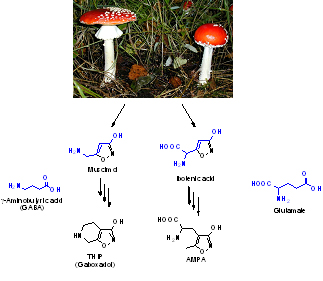Invited
Speaker
Conversion of Natural Toxins such as the Mushroom Toxins Muscimol
and Ibotenic Acid into Glutamate Receptor Ligands
Kristian Stromgaard
Denmark

The neurotransmitters γ-aminobutyric acid (GABA) and glutamate are
the principal inhibitory and excitatory, respectively neurotransmitters
in the central nervous system. Thus, GABA and glutamate are vital
for the normal physiological function of the brain and are profoundly
involved in a plethora of diseases in the brain. Thus a thorough understanding
of these transmitter systems is of utmost importance in the unraveling
of the basic functions of our brain, as well as in the potential treatment
of brain diseases, such as Alzheimer’s disease and schizophrenia.
Notably, constituents of the toxic mushroom Amanita muscaria have
proven to be exceptionally useful in such studies.
In seminal work by Povl Krogsgaard-Larsen and colleagues, exploited
muscimol and ibotenic acid from Amanita muscaria in extensive medicinal
chemistry studies providing a number of both indispensable pharmacological
tools as well as clinically relevant compounds. Muscimol have been
used as a lead structure providing several compounds with various
effects in the GABA area, most notably THIP (Gaboxadol), which is
being pursued as a novel type hypnotic. Similarly, ibotenic acid has
lead to a-amino-3-hydroxyl-5-methyl-4-isoxazole-propionate (AMPA),
which is defining a subgroup of glutamate receptors, the AMPA receptors.
These studies together with related studies on other types of neuroactive
natural products, and how these have been exploited with respect to
fine-tuning their pharmacological profiles at glutamate receptors
will be presented in the talk.
|



